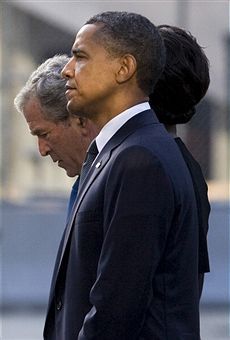 After all the nerves and security in New York, Washington and London, the only attempted
terror plot on the anniversary of 9/11 appears to have been foiled outside an arts centre in Gothenburg. The Swedish press says that the four people arrested on Saturday night are believed to belong to a cell linked to al-Qaeda.
There are no more details yet, but it’s a reminder that the al-Qaeda threat has not gone away. Its Arabian Peninsular
division is still active, responsible for the underpants bomber and the bomb bound for Detroit, intercepted in London. This is also a reminder of how chillingly random its attacks are.
After all the nerves and security in New York, Washington and London, the only attempted
terror plot on the anniversary of 9/11 appears to have been foiled outside an arts centre in Gothenburg. The Swedish press says that the four people arrested on Saturday night are believed to belong to a cell linked to al-Qaeda.
There are no more details yet, but it’s a reminder that the al-Qaeda threat has not gone away. Its Arabian Peninsular
division is still active, responsible for the underpants bomber and the bomb bound for Detroit, intercepted in London. This is also a reminder of how chillingly random its attacks are.
This matters because there is a school of thought in the West that 9/11 and 7/7 attacks were somehow punishment for foreign policy, and the best way of insulating a country against terrorism is to change foreign policy. This was precisely Bin Laden’s message, and in a videotape seven years ago he even used Sweden as an example. “Bush says and claims that we hate your freedom,” he said. “If that were true, then let him explain why did we not attack Sweden?” But there is no such logic to al-Qaeda’s strategy, or Islamic terror attacks in general. Last December a suicide bomber named Taimour Abdulwahab al-Abdaly blew himself up in downtown Stockholm, injuring two people.
The truth is that Islamic terrorism is an utterly random evil, which will strike where it can. As Al-Qaeda starts to disintegrate, it is encouraging its agents to take what security officials call a “Nike approach” to terror: i.e. ‘just do it’. That is to say, carry out a crude and quick attack before the authorities can find you. This new development in terrorism means that the plots will be smaller-scale, but harder to intercept. They also mean that terror attacks are likely to become more arbitrary, senseless and indiscriminate than ever before. It could well be that Gothenburg has just managed to thwart such an attack.







Comments